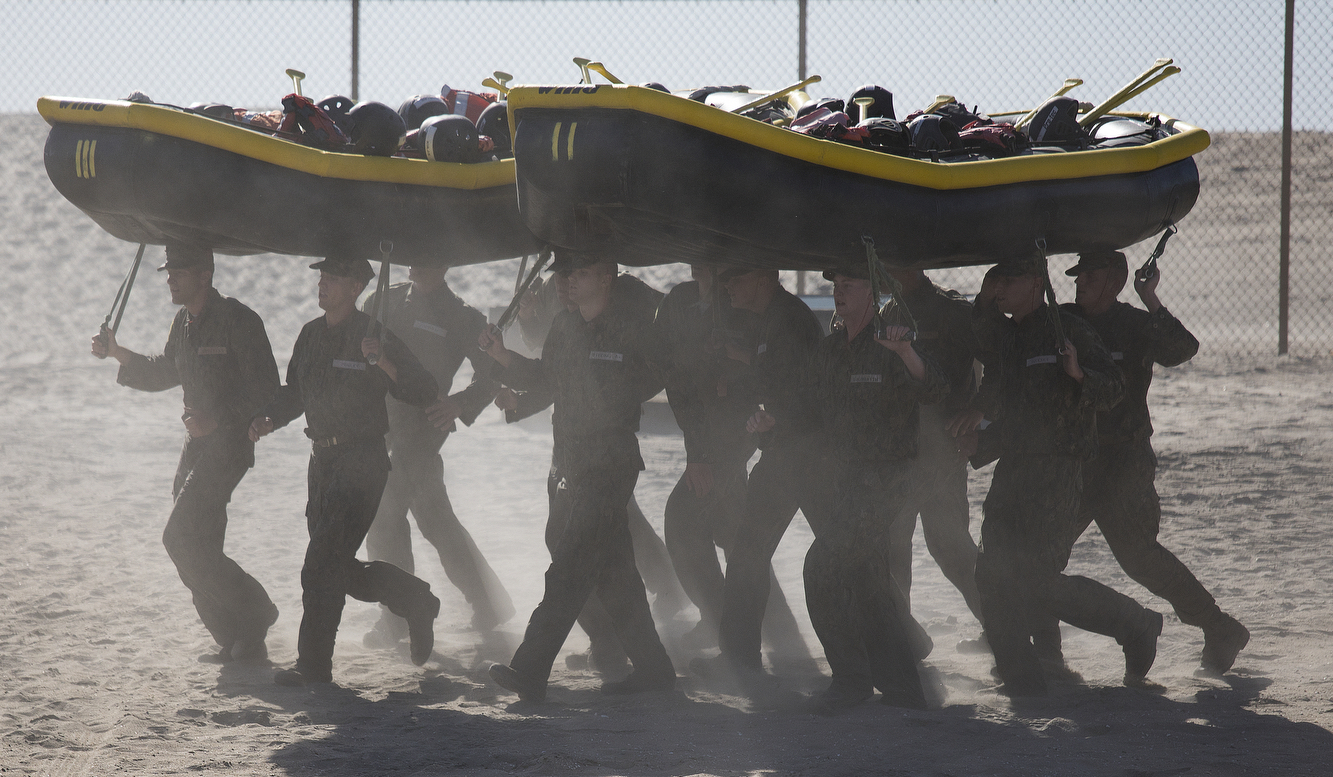

Naval Special Warfare Command, or NSW, will soon begin randomly testing sailors for
steroids and other performance enhancing drugs without having to establish probable cause first, a command spokesman said.
Navy Rear Adm Keith Davids, head of NSW, announced on Friday that the program will test 15% of the personnel in randomly selected units for performance enhancing drugs starting on Nov. 1. This testing will be in addition to the Navy’s standard drug tests.
The 2022 death of a Navy SEAL recruit and subsequent investigations had focused attention on use of steroids and illicit drugs in NSW, which oversees the Navy’s elite special operations units.
A NSW spokesperson told Task & Purpose Friday that the move is meant to protect the health and welfare of NSW sailors.
“If you saw someone, for example, about to get behind the wheel of a car and they had been drinking beforehand, what would you do? You would stop that person from making that terrible decision,” the spokesperson said. “In some ways this kind of the same thing. We don’t want anybody in our enterprise to take something that has no science behind it and ultimately can cause all sorts of health issues down the line. It’s not worth it at all.”
Subscribe to Task & Purpose Today. Get the latest military news and culture in your inbox daily.
The Sports Research Medicine and Testing Laboratory in Utah will conduct the testing for any substances not produced by the human body, the spokesperson said.
Any NSW sailors who are found to have wrongfully used performance enhancing drugs without a prescription will face mandatory processing for administrative separation and possible disciplinary action, the NSW spokesperson said. Sailors who test positive for such substances can also be held back from pending deployments while an inquiry takes place.

At NSW’s famously grueling SEAL and Special Warfare Combat Crewmen training programs, candidates who test positive will be instantly removed from training, the spokesperson said.
Sailors with legitimate medical need for otherwise-banned prescription medications including testosterone and human growth hormone will be accommodated, the command spokesperson said.
“We encourage members with concerning symptoms to speak with their medical providers to get diagnosed and properly treated,” the spokesperson said. “It is the unauthorized and/or unsupervised use of medications, both legitimate and illegitimate, which may cause short and long-term harm to the member that we are trying to identify and manage.”
NSW’s announcement on Friday about random testing for performance enhancing drugs comes after the death of Navy SEAL candidate Kyle Mullen in February 2022 during the “Hell Week” portion of Basic Underwater Demolition/SEAL training. Although human growth hormone and other medications were found in Mullen’s car after he died, an investigation found that Mullen had “died in the line of duty, and not due to his own misconduct.”
Three senior officers involved with Mullen’s training will face an admiral’s mast on charges of negligent dereliction of duty.
Evidence so far indicates that the use of performance enhancing drugs by NSW sailors is rare, the NSW spokesman said. So far, only 3 of 434 SEAL/ Special Warfare Combat Crewmen have tested positive for such substances since the latest testing for performance enhancing drugs began in March.
Still, the Navy SEAL community in particular has long wrestled with substance abuse issues. In 2018, NSW discharged 10 enlisted SEALs who tested positive for cocaine and methamphetamines. The following year, an internal investigation found that six members of SEAL Team 10 who used cocaine had managed to pass drug tests by procuring clean urine samples.
Regina Mullen, mother of Kyle Mullen, said that her son told her that his fellow sailors had encouraged him to use performance enhancing drugs to get through “Hell Week.”
She remains furious that the investigation into her son’s death mentioned the medications found in a car that he shared with several other sailors. The report found, echoing an initial autopsy report, that Mullen died of pneumonia developed during training, unrelated to performance enhancing drugs.
Regina Mullen also told Task & Purpose that she believes NSW should start blanket testing for performance enhancing drugs.
However, the overriding issue is not steroids, she said. Rather, NSW still has not addressed the lack of medical care that SEAL candidates receive during BUD/S.
“They’re just trying to shift the narrative,” said Regina Mullen, a registered nurse. “They promote SEAL training as the elite training in the world, yet the medical is like Stone Age medical and it’s not elite medical that is required. If they are subjecting the men to this type of training, that medical needs to be there – and it’s still not.”
The latest on Task & Purpose
- 101st and 82nd Airborne Division soldiers deploying to Eastern Europe
- Have you seen me? All the best ‘Missing F-35’ memes
- Marine Corps searching for F-35 after pilot ejects in South Carolina
- Senate bypasses Tuberville on Joint Chief nominations for Brown, George
- Search for missing Marine F-35B finds debris field
- 101st and 82nd Airborne Division soldiers deploying to Eastern Europe
- Have you seen me? All the best ‘Missing F-35’ memes
- Marine Corps searching for F-35 after pilot ejects in South Carolina
- Senate bypasses Tuberville on Joint Chief nominations for Brown, George
- Search for missing Marine F-35B finds debris field